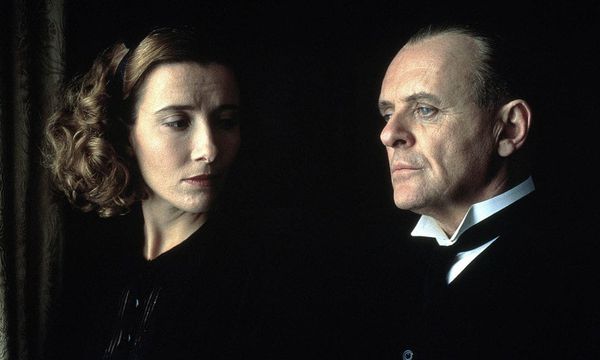Eye For Film >> Movies >> The Remains Of The Day (1993) Film Review
The Remains Of The Day
Reviewed by: James Benefield

Based on Kazuo Ishiguro’s Booker prize-winning novel of the same name, The Remains Of The Day is arguably the finest hour of period drama super director and producer team Merchant Ivory.
The story of Anthony Hopkins’ head butler Mr Stevens is a heartbreaking one. Stevens presides over the staff at Darlington Hall, the residence of Lord Darlington (James Fox). The lord is something of a misguided figure; during the interwar years he has an increasing sympathy for the German situation. Over time, the important leaders and politicians who meet at and visit the English country pile grow somewhat more selective.

Yet, Stevens carries on regardless. It’s hard to say whether he is bothered by this; even at an important function in which his under butler father (played by Peter Vaughn) is dying in an upstairs room, Stevens remains devoted and emotionally detached.
It becomes clear, however, that Stevens’ romantic feelings are harder to keep in check. The butler grows fond of the young housekeeper Miss Kenton (Emma Thompson). Unfortunately, his flirting only goes as far as presenting attention seeking fronts of stubbornness. Years go by, Miss Kenton leaves, and American millionaire Jack Lewis (Christopher Reeve) takes over the property. Yet, Stevens remains. And, after many many years, Stevens and Miss Kenton start sending each other letters.
Central to the film are ideas concerning what is right, what is proper. The implication is that social climates can be formed, and ideas can be implanted in people’s heads, ideas which are completely divorced from any kind of emotional sincerity and truth. Yet these ideas and trappings are as fundamental to their world as ideas of truth and sincerity. Even if you have an idea of problems with the system, you are member of your culture first, and a free-thinking agent second. It’s telling that this film discusses Nazi politics.
This is a thread that applies to both of the tale’s main strands: the relationship between Thompson's and Hopkins’ characters, and the film’s more political aspects. James Fox’s lord projects some far right views, yet is quick to take children in to his care. He’s not, in any clear-cut sense, a ‘monster’. Likewise, Stevens says what he says, and doesn’t say, partly to keep the affairs of the house smooth and unproblematic. It’s something demonstrated by the episode of his father’s death, and also his response to Miss Kenton’s resignation threats over the sacking of two Jewish members of staff.
The ideas are presented in a crisp, unfussy way by James Ivory. He’s working with an intelligent script by Ruth Prawer Jhabvala, and two impeccable central performances by Hopkins and Thompson. Hopkins is particularly fine. There’s one scene, towards the end, in which Miss Kenton confronts Stevens over a book he is reading in his private quarters. The result is devastatingly sad, and, helped by the last, lonely shot of Hopkins backed into a corner, ranks with some of the Nineties' greatest screen moments.
Yet, in the film’s climax, you realise that these are people struggling for redemption, both political and personal (not to say that the two are not interlinked). It’s an entirely appropriate ending for a quiet, reflective and incredibly moving film.
Reviewed on: 14 Jan 2010

















